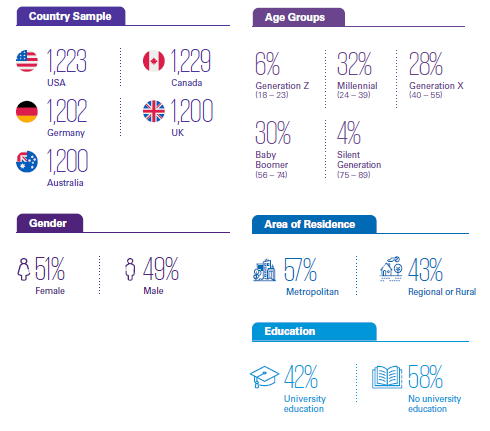In a previous post, I wrote about how trust should be understood and that it is related to the uncertainty of the actions of humans, not machines. However, we colloquially use the term trust in machines and in artificial intelligence as well, which is why KPMG and the Univertsity of Queensland conduct an annual survey on people’s trust in AI. What results can be found in the latest available survey from 2021?
The authors of the survey highlight four key factors that affect people’s trust in AI. First, are beliefs about the adequacy of current regulations
and laws to safely use devices equipped with artificial intelligence. Second, is the perception of AI’s impact on jobs and the eventual replacement of humans with machines. Third is the knowledge and understanding of how AI works in different areas of life, and fourth is the perception of AI’s impact on society as a whole.
In Figure 1, I have shown who participated in the survey and the distribution of the survey group.

Figure 1. Study group
Source: https://kpmg.com/de/en/home/insights/2021/06/artificial-intelligence-five-country-study.html
The research showed that people are still reluctant to trust AI-equipped systems, especially when it concerns, for example, human resources management in their workplace or health care. At the same time, those surveyed gave a poor assessment of artificial intelligence’s ability to deal with current problems that humans would handle easily. Interestingly, as many as 42% of respondents accepted the presence of AI in our lives and only 9% strongly rejected such solutions. Confidence in AI depended strongly on the age of respondents. For example, 34% of those aged 18-39 trusted, while only 24% of those aged 56-89 did.
Another interesting result was who people trust when it comes to developing AI in everyday life. In first place were universities and research institutes (45% of people expressed complete trust), and in last place… government agencies (only 24% of people trusted them). According to those surveyed, the biggest influence on trust in artificial intelligence is the protection of personal data and the transparency of its use.
The key findings of the survey are:
- People trust AI poorly, but generally express acceptance of such systems in everyday life.
- The more respondents felt that it was difficult to determine the impact of AI on our lives, the less they trusted such technologies.
- People’s trust in artificial intelligence depended strongly on the purpose for which the AI system was to be used.
- Respondents wanted to know more about how AI works and the potential consequences that artificial intelligence could have on their lives.
- Respondents saw a strong need for international regulation to safeguard their lives from the unwanted impact of AI.
You can read more:
https://home.kpmg/de/en/home/insights/2021/06/artificial-intelligence-five-country-study.html

